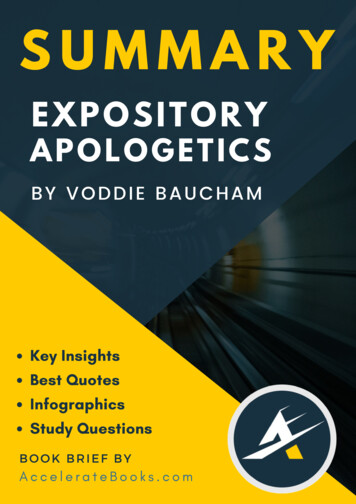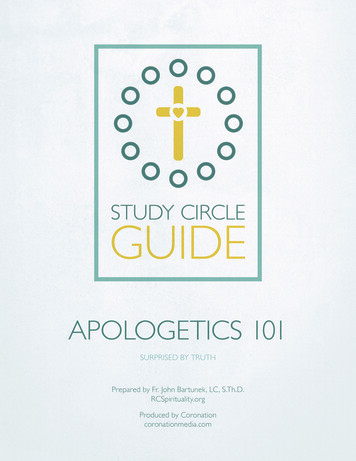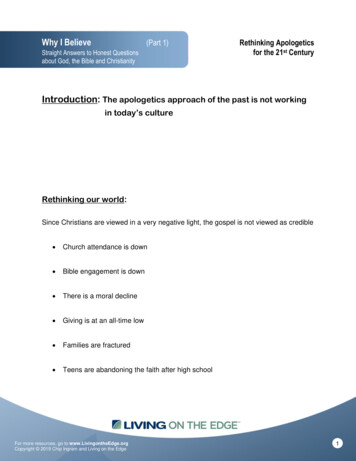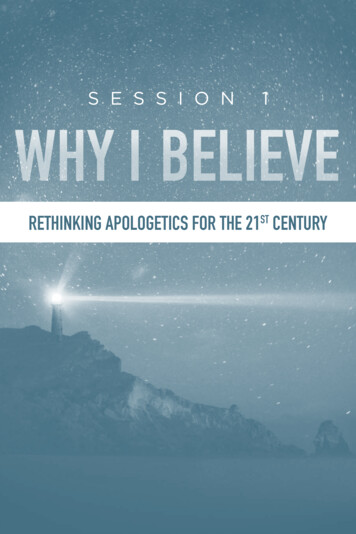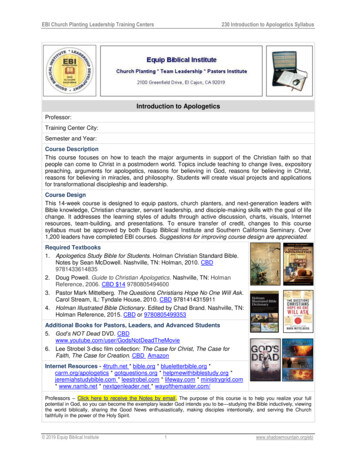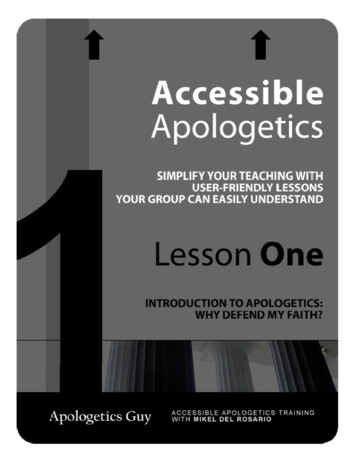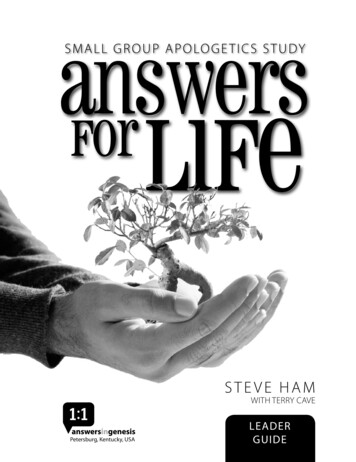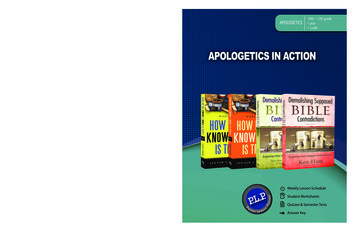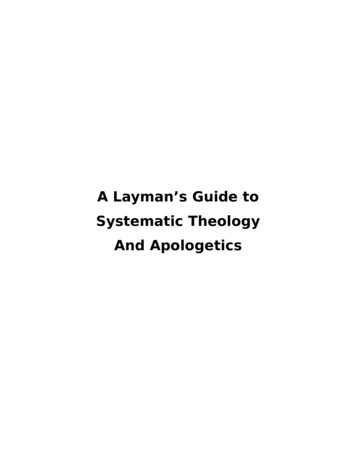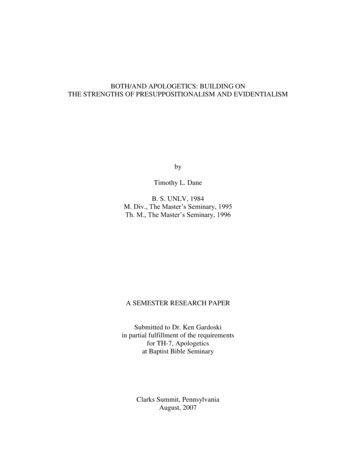
Transcription
BOTH/AND APOLOGETICS: BUILDING ONTHE STRENGTHS OF PRESUPPOSITIONALISM AND EVIDENTIALISMbyTimothy L. DaneB. S. UNLV, 1984M. Div., The Master’s Seminary, 1995Th. M., The Master’s Seminary, 1996A SEMESTER RESEARCH PAPERSubmitted to Dr. Ken Gardoskiin partial fulfillment of the requirementsfor TH-7, Apologeticsat Baptist Bible SeminaryClarks Summit, PennsylvaniaAugust, 2007
TABLE OF CONTENTSChapter1. INTRODUCTION: THE CHALLENGES TO BE OVERCOME .4Purpose of the Study .5The Stated Mandate for Apologetics .7Apologetics Throughout Church History.10The Rise of Presuppositional Apologetics .11Limitations of the Study.122. PRESUPPOSITIONALISM AND EVIDENTIALISM IN BRIEF .13Main Tenets of Presuppositionalism.13A Commitment to Presuppose the Bible at All Times .13A Commitment to Presuppose Trinitarianism .15A Commitment to Presuppose Total Depravity .17A Commitment to Presuppose the Superiority of Negative Apologetics .18A Commitment to Presuppose the Need for a Transcendental Argument .20Main Tenets of Evidentialism .23A Recognition of General Revelation .23A Recognition of the Value of Theistic Arguments .23A Recognition of the Abiding Image Within Man .24A Recognition of the Role of Evidence .25A Recognition of the Manifold Work of the Spirit .26A Recognition of the Need for Patient Evangelism .293. GLEANING STRENGHTHS FROM EACH APOLOGETICAL METHOD.30The Strengths of Presuppositionalism .30A Proper Emphasis on Relying on Special Revelation .302
A Proper Emphasis on Not Granting Theological Neutrality .33A Proper Emphasis on Striking at the Heart of Disbelief .34The Strengths of Evidentialism .35A Proper use of General Revelation .36A Proper Emphasis on the Value of Giving Reasons .36A Proper Allowance for Human Rational Faculties .384. IDENTIFYING POTENTIAL WEAKNESSES OF EACH METHOD .41The Weaknesses of Presuppositionalism .41A Misdefinition of Total Depravity/Noetic Effect of Sin .41A Confusion in Issues of Ontology and Epistemology.43A Failure to Recognize the Biblical Significance of General Revelation .45A Misplaced Emphasis on Defending Theological Systems .50The Weaknesses of Evidentialism .54An Underestimation of the Noetic Effect of Sin .54A Misplaced Focus on the Value of “Proving God”.55A Tendency to Minimize the Use of Direct Spiritual Truths.565. SYNTHESIZING FINDINGS AND AGREEMENTS .58A Call to Embrace the Implications of Total Depravity .58A Call to Embrace the Implications of an Abiding Image in Man .60A Call to Embrace the Implications of Evidence and Theistic Arguments .63A Call to Embrace the Implications of Regeneration Through Repentance .66A Call to Embrace the Implications of Patient Evangelism .68A Call to Embrace the Implications of Holy Living for a Bold Testimony .706. CONCLUSION .71BIBLIOGRAPHY .723
CHAPTER 1INTRODUCTION: THE CHALLENGES TO BE OVERCOMEApologetics embraces the basic idea of presenting and defending the truths of theChristian faith, or as noted in the foreword to To Everyone An Answer, it is “opening thedoor, and clearing the rubble, and getting rid of the hurdles so that people can come toChrist.”1 Most definitions of apologetics would usually also include the idea thatapologetics has value for both the unbeliever and the believer. For the unbeliever, thepurpose and value of apologetics consists of its use in evangelism, or as some mightprefer to label it, pre-evangelism.2 In this task, the apologist is striving toward the goal ofovercoming obstacles to faith in the mind of the unbeliever so that he/she might come totrust Jesus Christ as Savior. The value of apologetics, then, lies in helping the unbelieversee that the Christian message is true, and that any supposed problems in the mind of theunbeliever for accepting this truth claim are not, in fact, legitimate and should bediscarded.For the believer, the value of apologetics lies in the sense that a greaterunderstanding of the Christian message can help believers become increasingly confidentin the message they have already committed themselves to. Through apologetics, thebeliever can find answers to questions that may seem to cause a level of intellectualconflict. Perhaps that believer does have genuine trust that the Bible is true, but he hearscertain claims that contradict his understanding of the Bible and cause him to experience1Francis Beckwith, William Lane Craig and J. P. Moreland, eds., To Everyone An Answer(Downers Grove: IVP, 2004), 9.Grover Gunn, “A Short Explanation and Defense of Presuppositional Apologetics,” http://capo.org/cpc/apolo00.htm , accessed on July 9, 2007, 1.24
a lack of full confidence. Apologetics can have value, then, for this kind of person due tothe fact that a growing sense of confidence can help to embolden the believer infollowing and serving Christ. As Josh McDowell worded it, “Personally, my heartcannot rejoice in what my mind reject.”3 His point is valid: it will be hard to fullyembrace any claim if that claim appears logically impossible, self contradicting, or fullyagainst all rationality. The goal, then, would be to help Christians understand the reasonswhy they should embrace every biblical truth claim without reservation.4Purpose of the StudyThis study will focus on the debate that often takes place between people whoembrace two different methods of apologetics. These two methods of apologetics arecalled Presuppositional Apologetics (PA) and Evidential Apologetics (EA), which for thepurposes of this paper will embrace the idea of both Evidential Apologetics and ClassicalApologetics.By and large, the issue in this debate should never be seen as one that is betweenan orthodox, historic Christian tradition and something that is otherwise. Although theremay be some from one camp or the other who might step outside the bounds oftraditional Christianity in certain statements, this really is not the issue of this debate.This disclaimer is necessary at this point, however, due to the fact that some of thewriters on this topic (usually coming from those who are strongly committed to PA)3Josh McDowell, Evidence That Demands A Verdict, Vol. 1 (San Bernardino: Here’s Life, 1972),3.4J. P. Moreland, Scaling the Secular City (Grand Rapids: Baker, 1987), 12. Moreland also makesnote about the way that apologetics can “contribute to health in the culture at large” due to the fact thatapologetics by nature involves the application of Christian truth to society.5
make it appear as though anyone who does not fully embrace every aspect of theirapologetical system is not being “biblical” in their methods. Cowan notes that in hisearly exposure to these two forms of apologetics, some were telling him to beware of“this bogeyman called ‘presuppositionalism.’”5 A large part of the purpose of this paperis to explore whether or not these kinds of claims from either side are justified. Certainlythere are more than one from the Reformed and presuppositional perspective who seemuch value in PA, but also recognize some of its weaknesses.Krabbendam reflects on how Van Til introduced him to apologetics in 1960 andhow three major Van Til concepts stood out to him: (1) the importance of apresuppositional approach, (2) the importance of the Trinity as an ontological foundationfor all reality, and (3) Van Til’s strong resistance to any dialectical thinking thatgravitated toward rationalism, irrationalism, or any combination thereof.6 Thirty fiveyears later Krabbendam writes that even though he can endorse PA, “this is not to saythat Van Til has spoken the final apologetical word so as to exclude the need for anyexpansion, or even revision of his thinking. In fact, there seem to be two areas in VanTil’s apologetics that could stand revision.”7In view of the preceding comments, this paper will examine whether it is possibleto identify particular strengths in each apologetical system that might complement eachother. This paper will explore whether these strengths might be combined in such a waythat strengths of each system might be magnified and any potential weaknesses might be5Steven Cowan, ed., Five Views on Apologetics (Grand Rapids: Zondervan, 2000), 7.6Henry Krabbendam, “Cornelius Van Til: The Methodological Objective of a BiblicalApologetics,” WTJ 57:1 (Spring 1995): 125.7Ibid.6
identified and minimized. If this kind of both/and apologetical methodology is possiblewithout ceasing to be “biblical,” then the apologist might find himself much betterequipped for accomplishing the kinds of apologetical purposes noted at the beginning ofthis introduction. Ronald Mayers has done a fine job of presenting this kind of approachin his book Balanced Apologetics.8 This study will seek to build on his work(particularly in the summary portion of this paper), and a variety of other resources aswell, to develop a both/and apologetic that employs the strengths of each system.The Stated Mandate for ApologeticsThere is good biblical support for the idea that Christians have a mandate topractice apologetics. Many people rightly appeal to 1 Peter 3:15 which tells Christiansthat they are to always be ready to “sanctify Christ as Lord in your hearts, always beingready to make a defense to everyone who asks you to give an account for the hope that isin you, yet with gentleness and reverence” (NASB).9 The English word “apologetics”comes from the Greek term apologia (ἀπολογία), a term which carries the connotation of“defense” (as it is rendered in the NASB of 1 Pet. 3:15) or “answer,” such as in the lightof questioning or examination.10 The New Testament uses the term eight times with afairly consistent meaning. Usage suggests that the idea of answering questions anddefending are central to the term ἀπολογία.8Ronald B. Mayers, Balanced Apologetics (Grand Rapids: Kregel, 1984).9The NASB will be used for all Bible citations unless otherwise noted.10D. Edmond Hiebert, 1 Peter (Chicago: Moody, 1984), 227-228. Hiebert notes that the term“was used in connection with a formal defense” as is can be seen in certain uses by Paul, but it was alsoused of “more private and informal utterances,” too, and that it would be arbitrary to limit the term toformal judicial examinations. Hiebert says that a broader picture shows that Christians were being told tobe ready to give a defense of their faith in any and every circumstance where it might become necessary.7
Luke uses the term in Acts 22:1 to show how Paul had to make a “defense” atCaesarea before the Jews who were accusing him of crimes against Jewish law.11 Paulwas under attack and the way to respond was to make a “defense.” Similarly, Paul usesthe term again in 1 Corinthians 9:3 to speak about the fact that he had to “defend” himselffrom the attacks of personal critics. In 2 Corinthians 7:11 Paul uses the term to talk abouthow the Corinthians’ repentance and change of conduct was providing a “defense” forthem against the shameful conduct of their former sins. The two uses in Philippians areparticularly relevant for the technical sense that this paper is dealing with. In 1:7 Paulspeaks about the way his apostolic ministry includes “the defense and confirmation of thegospel.” The latter term connotes the idea of making something sure and certain whilethe former (ἀπολογία) once again speaks about the idea of answering accusations andgiving reasons (i.e., defending). In 1:16 Paul uses the term again talking about the factthat as an apostle he has been “appointed for the defense of the gospel.” Theseexpressions show that a significant aspect of Paul’s apostolic role was declaring theChristian faith and defending it to an unbelieving world so that men might come to seethe truthfulness of the message and believe it. The eighth use is in 1 Peter where Petercommands the Christian that to be ready to “make a defense” to everyone who asks areason for the hope that the Christian holds.1211The term is used several times in the Bible in legal contexts with reference to one making adefense before accusers (Acts 22:1; 25:16; 2 Tim. 4:16).12The context of 1Peter in general and this verse in particular seems to deal with a hostileunbelieving world that is constantly making verbal accusations against the Christian faith and Christians asindividuals. Special Introduction suggests that this book was written before widespread physicalpersecutions had broken out in the Roman Empire, but early church history strongly shows that theunbelieving world was quite antagonistic against the faith. To this extent, the message about giving adefense of the faith to a hostile world is directly applicable to present times as well.8
Beyond focusing only on the term ἀπολογία itself, one should also take intoaccount other direct commands of the New Testament to proclaim the truths of the gospelto the surrounding world. For example, the Great Commission gives an explicitcommand to make disciples (learners) by proclaiming the gospel (Matt. 28:18-20). Onecan also see how Paul commands Timothy to be tireless in proclaiming the gospel andpreaching the word (2 Tim. 4:2). In this passage, Paul also tells Timothy that he is to dothe best he can to patiently and gently strive at “correcting those who are in opposition, ifperhaps God may grant them repentance leading to the knowledge of the truth, and theymay come to their senses and escape from the snare of the devil, having been held captiveby him to do his will” (2 Tim. 2:24-26). Perhaps even more than 1 Peter 3:15, this text isshowing the church that it has an obligation to strive with those who are in error so thatGod might use those efforts to bring them to saving faith. Certainly the sovereignty ofGod in granting grace is the ultimate basis for this salvation, but this text explicitly showsthat God (the Spirit) works through the instrumentality of clearly taught Christian truth.This entire endeavor is a two-fold task—negative and positive. The positive sideis declaration of Christian truth. The negative side is showing where someone isembracing error (e.g., 2 Tim. 2:25: “correcting those who are in opposition”). As theBible shows, the skill of an elder must include this two-fold ability. He must be holdingfast the faithful word which is in accordance with the teaching so that he may be ableboth “to exhort in sound doctrine” and (2) “refute those who contradict” (Tit. 1:9).The key point that cannot be ignored at this early stage in this study is the factthat the Bible does, in fact, command the church to proclaim the truths of Scripture,defend the truths of Scripture, and patiently strive with those who are opposed to these9
truths so that God might use these efforts to open eyes and bring men to believe the truth.This is the task called apologetics.Apologetics Throughout Church HistoryChurch history shows that from time to time the method of apologetics wouldbecome a point of controversy. Sproul makes mention, for example, of Henry Dodwellwhose 1740 work Christianity Not Founded On Argument was a book that argued thatChristianity is a religion based on “faith,” and not a religion based on “reason.”13Dodwell apparently objected to the idea that one should supply reasons for faith.Regardless of debates in methodology, it is clear that there is a task to performand that this task can include a variety of means. Both testaments of the Bible(particularly the NT) show the reader that a follower of God is supposed to proclaim amessage of truth, and both testaments also show that it is not against the Bible for one togive reasons why someone should believe what God has spoken. God Himself appeals toHis own fulfilled prophecies as firm evidence for why the people of Israel should believeHim (e.g., Is. 46:8-11). The OT shows the reader appeals to evidence; the NT showsappeals to evidence (cf. 1 Cor. 15:1-3); church history provides countless illustrations ofthose who not only proclaimed biblical truth, but also defended that truth and providedreasons why others should accept and believe their message. This does not mean thatthese evangelists (“apologists”) held a view that God is not trustworthy unless oneprovides proof. What this history does demonstrate, though, is that Christians have13R. C. Sproul, John Gerstner, Arthur Lindsley, Classical Apologetics (Grand Rapids: Zondervan,1984), 13.10
historically felt the liberty to defend the Christian faith against attacks and this defensehas often consisted in showing logical reasons why the faith should be believed.The Rise of Presuppositional ApologeticsIn the 20th century, a philosophy of apologetics arose whose proponents began toseriously call into question the idea of using evidence and reason in presenting anddefending the faith. This philosophy of apologetics has been built on the teachings ofmen in the Dutch Reformed tradition like Groen Van Prinster and Abraham Kuyper, butespecially on the teaching ministry and writings of Cornelius Van Til.14 Van Til receivedhis Ph. D. from Princeton University and became a professor of apologetics atWestminster Seminary where he taught for over 40 years. Over the years to come, VanTil’s landmark book on apologetics The Defense of the Faith (published in 1955) wouldbecome a huge influence in the field of apologetics.15The teaching and writing ministry of Van Til, with his “presuppositional” style ofapologetics, (an expression that he himself tried to shun),16 would convince many that apresuppositional method of apologetics is really the only proper way to practiceapologetics, and any deviation from this method is a deviation from being biblical. ForVan Tilians, the conviction is that Christ “must be offered without compromise.”17 In theeyes of Van Til, any time the apologist is not challenging a man to “make his every14William Edgar, “Without Apology: Why I Am A Presuppositionalist,” WTJ 58:1 (Spring 1996):15Cornelius Van Til, The Defense of the Faith (Phillipsburg: Presbyterian and Reformed, 1955).18.16John Frame, “Presuppositional Apologetics,” http://www.framepoythress.org/frame articles/2005Presuppositional.htm , accessed on July 8, 2007, 4.17Van Til, The Defense of the Faith, 3.11
thought captive to the obedience of Christ,” that apologist is becoming guilty ofcompromise—a compromise that is basically Roman Catholic in origin and nature.18These are serious accusations against the non-presuppositionalist apologist.19Over the next several decades, the disciples of Van Til studied his philosophy ofapologetics, rearticulated his philosophy of apologetics, and promoted it as being the bestway of practicing apologetics. The serious claims and accusations of these proponentsneed to be analyzed for validity.20 As part of this study, this paper will consider whetheror not the presuppositional method is the best method of apologetics, the only method ofapologetics, a helpful method to be selectively employed, or none of the above.Limitations of the StudyHuge volumes of literature have been written on both sides of this debate over theyears. This paper will restrict itself to a selected number of textbooks and journal articlesfrom a variety of writers on both sides of the debate. This paper will present the methodsof these various writers and analyze them for what this author believes are the strengthsand weaknesses. From the observations out of these writings, this paper will seek topresent an eclectic both/and apologetic that builds on the strengths of each system.18Ibid.19In his apologetics article titled “The Defense of Christianity,” Van Til introduces a hypotheticalevangelistic scenario involving an unbeliever, Mr. Black, a presuppositionalist, Mr. White, and a third partynamed Mr. Grey. Interestingly, Mr. Grey is not described as being an evidentialist or a classical apologist,but as an Arminian. From many angles, it would appear that Van Til was driven by the idea that anythingless than his style of Presuppositional Apologetics was a form of Arminian theology or worse (“TheDefense of Christianity,” http://www.the-highway.com/defense VanTil.html , accessed on July 8, 2007,1).20Edgar, “Without Apology: Why I Am A Presuppositionalist,” 18. Edgar says that “it isregrettable that so much polarization has occurred between various schools, which often caricature eachother’s positions without doing the careful work of investigation needed in order to take a stand” (18). Thiswriter is in full agreement here.12
CHAPTER 2PRESUPPOSITIONALISM AND EVIDENTIALISM IN BRIEFAs a point of priority, it will be crucial to set forth the major tenets of eachapologetical method so that they reader might understand the philosophies and methodsof each system. This chapter will first set forth the major tenets of PA and follow thiswith an explanation of the major tenets of EA.Main Tenets of PresuppositionalismAlthough different writers might emphasize the significance of different points,one might identify at least five different concepts that make up major tenets of PA.A Commitment to Presuppose the Bible at all TimesThe first of these major tenets is the commitment to always presuppose the Biblein any kind of apologetical situation.21 The presuppositionalist says that one shouldalways go into the apologetical situation, not only believing that the Bible is the onlysource of authoritative truth, but also making it clear to the unbeliever that this is so. AsEdgar has put it, “Whatever else one may say about the details of presuppositionalism,this is its core. It begins and ends frankly with authority. . . . Beginning with properbiblical authority is the most reasonable move one could make.”22 The apologist isstrongly encouraged to state this presupposition up front and call the unbeliever tocommit himself unreservedly to believe this claim. Krabbendam says that he can warmly21Frame, “Presuppositional Apologetics,” 2. Frame notes that “the supernatural revelation ofScripture . . . is among the assumptions, what we may now call the presuppositions, that Christians bring toany intellectual inquiry.”22Edgar, “Without Apology: Why I Am A Presuppositionalist,” 19.13
endorse this principle of unwavering commitment to Scripture as one of the greateststrengths of presuppositional thinking.23 This writer agrees with the value of this point.Mayers notes that one of the characteristics of the PA approach is that itapproaches apologetics with an a-priori versus a-posteriori theory of knowledge.24 Froma philosophical point of view, the significance of this choice essentially closes off certainkinds of objections that one can raise against all forms of a-posteriori arguments. Aposteriori arguments are those driven from observations, observations that can often bychallenged as being adequate due to empirical limitations. In effect, the presuppositionalmethod simply defines itself as being above challenge.The suggested approach, then, is for the apologist to tell the unbeliever that hebelieves the Bible is the Word of God and that the reason why he believes this to be so isbecause it is true. In terms of circularity, the apologist is to readily admit the circularityof the argument. The apologist is encouraged to point out to the unbeliever that everyonehas circularity in their basis of ultimate authority. Therefore, the unbeliever should notaccuse the presuppositionalist of being the only one with circular reasoning, sinceeveryone operates on the basis of circular reasoning.25 The presuppositionalist looks tothe Bible as the ultimate source of authority, but the unbeliever has ultimate authority too.In many cases, depending upon the claims of the unbeliever, the presuppositionalist will23Krabbendam, “Cornelius Van Til: The Methodological Objective of a Biblical Apologetics,”125.24Mayers, Both/And Apologetics, 198. Whether or not an a-priori argument is actually credibleand persuasive is an entirely different issue, though, from whether that same argument is formally valid.25Frame, “Presuppositional Apologetics,” 5. Frame makes a distinction between what he calls“narrowly” circular arguments “broadly” circular arguments. Frame sees the PA circular argument asbeing the latter due to the fact that “it presents more data to the non-Christian and challenges him toconsider it seriously.”14
tell the unbeliever that his circular reasoning comes by way of the fact that he believes inhis own power of human reason to accurately judge truth claims, and that this faith in selfas an autonomous source authority is a circular form of reasoning.Lorenzini discusses the significance of various levels of circular reasoning in hisarticle “Does Presuppositional Apologetics Use Circular Reasoning?” Lorenzini writesthat when “talking about an ultimate (emphasis original) intellectual criterion, a certainamount of circularity is unavoidable. . . . Every worldview (and every argument) musthave an ultimate, unquestioned, self-authenticating starting point.”26 Lorenzini(representing a PA concept) is basically correct in that sense, although one is notunjustified for adding further qualifiers to the bare statement. What Lorenzini is saying,though, is that one can either (1) let God’s spoken word be the ultimate authority or (2)let the power of empirical observation and reason be the ultimate authority.27 Eve wasfaced with this dilemma in the Garden. She knew what God said, but the words of theserpent, combined with her empirical observations prevailed in her judgment. She trustedher own powers of observation and reason and the result was disastrous.A Commitment to Presuppose TrinitarianismAnother kind of presuppositional commitment is to Trinitarian theology, inparticular to the ontological and epistemological implications of Trinitarianism. In theview of Krabbendam, “Van Til’s perspective upon the doctrine of the Trinity may well be26Massimo Lorenzini, “Does Presuppositional Apologetics Use Circular Reasoning?” http://www.frontlinemin.org/apolpresupp.asp , accessed on July 9, 2007, 1.27Lorenzini says that EA is circular because it begins with rationalism and also ends withrationalism, 2.15
his most significant theological contribution. . . . His point of departure is the traditionalview that the unity and diversity in the ontological Trinity are equally ultimate.”28The presuppositionalist is encouraged to remind the unbeliever that apart from thereality of the Trinity, there is absolutely no basis for any being. Therefore, in a very realsense, unsaved men are living their lives on the basis of the Trinity, but they are doing sounconsciously since they are not confessing personal trust and belief in Him.To illustrate, PA will say that the only basis for personality is due to thepersonality of the triune God and that the only basis for logic and rationality is due to thefact that such capacities are granted to mankind from the triune God. Thepresuppositionalist will say that the only basis for communication comes from the factthat there is a triune God. Furthermore, in terms of the age old philosophical dilemma ofthe tension between “the one and the many,” the only answer to this dilemma, says thepresuppositionalists, lies in the reality of the triune God.29 There is “the one” asrepresented by the fact that there is only one God, but there also is “the many” in that thisone God exists eternally in a trinity of persons.Schaeffer comments on this philosophical dilemma by noting that “if man startswith himself alone . . . he never comes to a universal, only to particulars and mechanics.The problem can be formulated thus: how can finite man produce a unity which willcover these particulars?”30 The answer to this dilemma is found in the person of Godwho exists eternally as One in essence yet at the same time in a triunity of personhood.28Krabbendam, “Cornelius Van Til: The Methodological Objective of a Biblical Apologetics,”29Ibid., 130.129.30Francis Schaeffer, The Francis Schaeffer Trilogy: The God Who Is There (Wheaton:Crossway, 1990),
This study will focus on the debate that often takes place between people who embrace two different methods of apologetics. These two methods of apologetics are called Presuppositional Apologetics (PA) and Evidential Apologetics (EA), which for the purposes of this paper will embrace the idea of both
